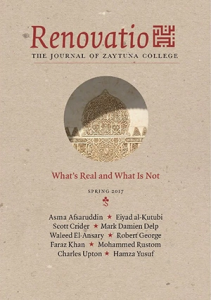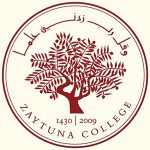Renovatio Journal 1 (Vol.1, No.1 Spring 2017): What's Real and What Is Not

Editor-in-Chief: Hamza Yusuf
Publisher: Zaytuna College
Year of Publication: 2017
Print Length: 105 pages
Genre: Islamic Studies / Theology, Ethics and Philosophy; Hadith, Sunnah & Sirah; Quranic Studies, Science; Non-Fiction / Religious Studies, Literary Criticism
Topic: Metaphysics, Reality, Ethics, Islam, Religious Thoughts & Philosophy, Prophet Muhammad ﷺ, Qur’an, Environmental Justice, Ecology & Climate, Science, Economy, Jihad, Poetics
Renovatio (renovatio.zaytuna.edu) is a Muslim journal about the ideas that have shaped our past and present world. We ask scholars, theologians, and writers to examine timeless questions and today’s moral challenges by drawing from the enduring texts of revelatory faith traditions and current thinking from philosophy, theology, and ethics to history, politics, the social sciences, and beyond.
Vol.1 No.1: What’s Real and What Is Not: How Metaphysics Can Help Us Understand Reality.
This inaugural issue of Renovatio focuses on the crucial role of metaphysics in understanding the world, its source, and our place in it.
Table of Contents
Contributors
Letter from the Editor – Hamza Yusuf
1. Can Our Science and Economics Honor Nature? – Waleed El-Ansary
Our insatiable desire to view nature as a material resource can only be repelled by acknowledging immaterial reality.
2. Do Reason and Revelation Guide Us to the Same Good? – Robert P. George
For Jews, Christians, and Muslims, confidence in what reason discloses as moral precepts is enriched by God’s act of revealing to us what He requires of us.
3. Can Materialism Explain the Mind? – Faraz Khan
Some philosophers believe materialism has now reached an insurmountable quandary in the question of consciousness.
4. Beware of What Comes Within from Without – Mark Damien Help
Does habitual exposure to digital images destroy the stillness of the heart required for seeing God within our soul?
5. Orientalists, Militants, and the Meanings of Jihad – Asma Afsaruddin
How widespread misuse of the term “jihad” creates confusion and misunderstanding about a core concept in Islam.
6. The Great Chain of Consciousness – Mohammed Rustom
Why did many Muslim metaphysicians see the universe and all of its contents as alive?
7. Al-Ghazālī on Cause and Effect – Eiyad al-Kurtubi
In his discussion on causality, did Imam al-Ghazālī succeed in safeguarding miracles as well as certainty about the world?
8. When A Metaphor Becomes Matter for A Christian – Scott F. Crider
Can we use poetics to understand scripture?
9. Is the Matter of Metaphysics Immaterial? Yes and No – Hamza Yusuf
During the “Golden Age of Islam”, philosophy was at the heart of the Muslim intellectual tradition. Its decline coincided with the decline of Islam. Is that a coincidence?
10. Hamlet’s Soliloquy – Charles Upton
Hamlet’s downfall did not arise out of a wrong answer to the question he posed, but out of the arrogation to himself of the right to determine his own existence or annihilation.
About Zaytuna College

Zaytuna College was founded in Berkeley, California, with a mission to educate and prepare morally committed professional, intellectual, and spiritual leaders who are grounded in the Islamic scholarly tradition and conversant with the cultural currents and critical ideas shaping modern society, through a traditional liberal arts education.
Source: https://zaytuna.edu/about
More from Zaytuna College in this library, click here.

Hamza Yusuf is president of Zaytuna College in Berkeley, California, the first accredited Muslim liberal arts college in the United States. A leading proponent of classical learning, the traditional liberal arts, and great books education in both the Western and Muslim traditions, he has translated, authored, and coauthored numerous publications, including scholarly books and articles as well as papers on major current areas of ethical concern. He holds traditional advanced degrees (ijazaat) in Islamic law and theology, as well as a BA in Religious Studies (San Jose State University) and a PhD from the Graduate Theological Union in Berkeley, California.
Source: https://sandala.org/pages/about-us
More from Hamza Yusuf in this library, click here.
